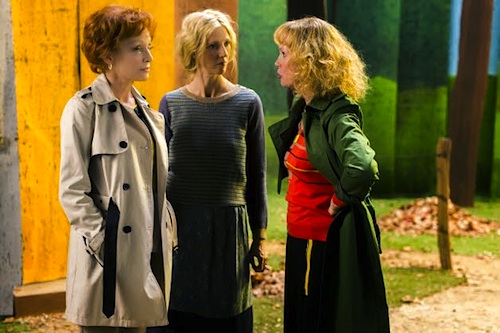By Joe Bendel. George Riley is dying, but don’t worry, you will not get too attached to the old playboy. In fact, the title character never appears in Alan Ayckbourn’s play, but we hear plenty about him from his friends. It is exactly the sort of sly theatrical device that would appeal to the late great Alain Resnais. For his final film Resnais went back to the Ayckbourn well a third time, adapting Life of Riley, which screens as a Main Slate selection of the 52nd New York Film Festival.
Colin and Kathryn are rehearsing for their roles in the latest production of their amateur theatrical company (Ayckbourn’s Relatively Speaking, naturally enough), but he is clearly preoccupied. Kathryn quickly extracts the truth from her doctor husband: their beloved friend Riley has less than a year to live. In violation of his professional ethics, the couple discusses his condition with their mutual friends, Jack and Tamara, deciding the play is the thing to keep Riley’s spirits up.
They also resolve to broker some sort of rapprochement with his estranged wife Monica, who has taken up with Simeon, a considerably older gentleman farmer. Despite their history together, Monica is not sure she can handle a reunion with George. Yet, she suddenly agrees to comfort her not quite ex-husband in his final hours, when it becomes clear Kathryn and Tamara might harbor eleventh hour romantic interests in Ayckbourn’s absent character.
Indeed, it all sounds like the stuff of midsummer French farce—and French it is indeed, even though Resnais retains the English trappings and Yorkshire country setting. He emphasizes the theatricality of it all with conspicuous fabric backdrops that look deliberately stagey, but give the film a rich, warm vibe thanks to the bold saturated colors. The cast of Resnais regulars hold up quite well in this slightly surreal environment, embracing their characters’ broad bourgeoisie anxieties. While everyone projects to the back row, so to speak, Sandrine Kiberlain and Hippolyte Girardot still manage to really connect on an emotional level, as Monica and Colin, respectively.

Of course, verisimilitude was never an obsessive preoccupation for Resnais, who throws it completely out the window in Life of Riley. Instead, he offers us the elegant illustrated transitions sketched by French cartoonist Blutch and X-Files composer Mark Snow’s uncharacteristically nostalgic soundtrack. There is even an apparent tip of the hat to Caddyshack (in did-I-just-see-that moments nearly as random as Wild Grass’s closing scene). In short, Resnais was not long for the world, but he was still having fun.
Indeed, that is the key to understanding Riley. On paper, the masterful You Ain’t Seen Nothing Yet would seem to be the perfect career capstone, given its elegiac tone and its pseudo-resurrection made possible through the power of art. However, like George Riley, Resnais went out on his terms, having one last romp, damning the expectations of others. The result may not be a great film, like the late career masterwork YASNY, but it is a good film, which is always a welcome thing.
Even if Life of Riley is not Resnais’s greatest film, it might be perfectly representative of the auteur’s motifs and strategies. Regardless, it is appealingly wry and sophisticated. Recommended for fans of Resnais and Ayckbourn, Life of Riley screens this Saturday (10/11) at the Beale, as part of this year’s NYFF.
LFM GRADE: B
Posted on October 11th, 2014 at 2:43pm.